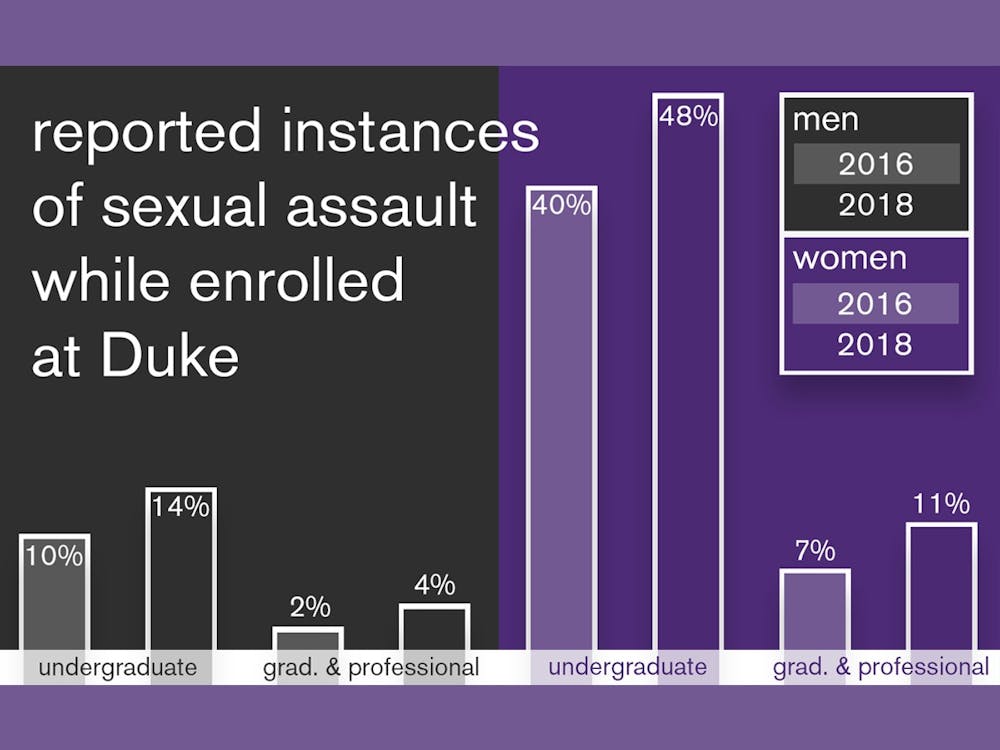If you’ve ever had a conversation about sexual assault at Duke, you might have heard of the Duke University Student Experiences Survey, which assesses campus climate surrounding sexual misconduct and sexual assault. But there’s a separate survey, standardized across universities, that Duke currently does not participate in.
The Association of American Universities (AAU), comprising 62 research universities in the United States, has administered its Campus Climate Survey on Sexual Assault and Sexual Misconduct twice. Twenty-seven universities participated in 2015 and 33 this past spring.
Although Duke is an AAU member, the University did not participate in the survey either time.
Mary Pat McMahon, vice provost/vice president for student affairs, and Jayne Grandes, assistant vice president of Title IX compliance, wrote in a joint statement via email that Duke contracted with RTI International in 2016 to achieve a goal similar to that of AAU’s: to help Duke’s administration “better understand the extent and nature of sexual misconduct at Duke.”
RTI has administered the Student Experiences Survey to the undergraduate and graduate student populations twice now, once in 2016 and again in 2018. The results of the 2018 survey were released in February and showed an 8% increase in the number of undergraduate female students that reported experiences of sexual assault while students at Duke, growing from 40% in 2016 to 48% in 2018.
Although Duke currently plans to conduct another Student Experiences Survey through RTI International in 2020, the University is considering joining the universities participating in AAU’s survey in future years.
“Student Affairs and [the Office of Institutional Equity] would like to see Duke join the AAU campus climate survey so we can make more meaningful comparisons over time,” McMahon and Grandes wrote. “We are now in conversations internally and hope to reach out to our colleagues at AAU as a next step.”
This partnership could begin as early as the administration of the next AAU survey in 2021, they explained. But for the sake of “continuity of data,” the RTI survey will take place as planned in 2020 in order to “better track trends over time” and “continue to use those data to enhance our prevention and response efforts.”
The AAU survey paints a different picture of peer universities. According to the full report on the 2019 Campus Climate Survey, the percentage of female undergraduate students reporting “nonconsensual sexual contact by physical force or inability to consent” ranged from 14% to 32% across the 33 universities surveyed. Consistent with the increase at Duke, the 21 schools that participated in both 2015 and 2019 saw an average of a 3% increase in the average rate reported by undergraduate women.
Like Duke’s survey, the AAU survey’s results showed significant levels of sexual misconduct on participating campuses, as well as disparities in rates of misconduct between categories of students, according to the report.
In the 2018 Student Experiences survey, 48% of undergraduate women and 49.7% of gay, lesbian and bisexual women reported experiences of sexual assault since enrolling at Duke, compared to 14% of undergraduate men.
On average, 25.9% of undergraduate women, 17% of gay or lesbian women and 30.9% of bisexual women reported experiences of nonconsensual sexual contact since beginning at their universities, compared to 6.8% of undergraduate men, according to the AAU survey.
“We need to be cautious about making comparisons of Duke’s results to those of other schools,” McMahon and Grandes wrote. “As best as we can discern from a review of the data, the results at Duke are generally consistent with our peer schools.”
They noted that one reason for these discrepancies may be the differences in how terms such as “sexual misconduct” and “sexual assault” are defined between surveys.
There are several new faces working in the realm of sexual assault and sexual misconduct policy on Duke’s campus this year, with a new vice provost/vice president for student affairs, a new director for Title IX complicance and a new vice president for institutional equity, among others.
“We are committed to reducing the prevalence of sexual assault in the Duke student community. While Duke has made significant strides in enhancing prevention and outreach, we can and need to do more,” McMahon and Grandes wrote. “We all hope to work closely with the Sexual Misconduct Prevention and Response Committee and to engage student leaders and colleagues in this important effort.”
Get The Chronicle straight to your inbox
Signup for our weekly newsletter. Cancel at any time.

